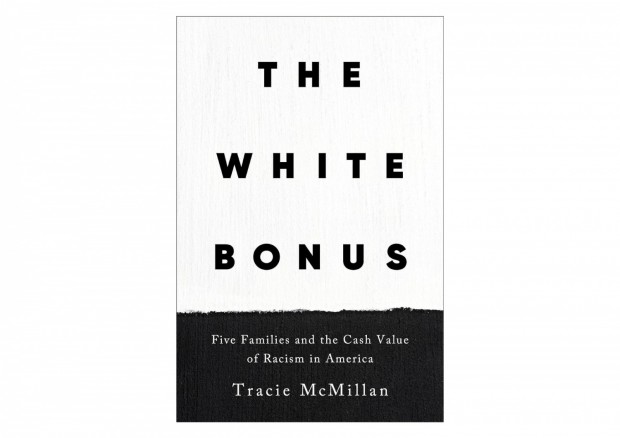Tracie McMillan Uncovers the Financial Advantages of Racism on White Americans in New Book 'The White Bonus'

Discover how Tracie McMillan exposes the financial advantages of racism on White Americans in her eye-opening book, "The White Bonus." Through meticulous research and personal anecdotes, McMillan unveils the hidden economic benefits of Whiteness.(Photo : Amazon/Tracie Mcmillan)
In her groundbreaking book, "The White Bonus: Five Families and the Cash Value of Racism in America," journalist and author Tracie McMillan delves deep into the financial advantages White Americans have accrued due to systemic racism. Through meticulous research, interviews, and personal anecdotes, McMillan sheds light on the often-overlooked economic benefits of being White in America.
McMillan exposes how racial advantages manifest as tangible benefits spanning generations and regions. Her research offers fresh insights into how race, wealth, and privilege intersect, making it essential for anyone navigating the complexities of racism in the United States.
Quantifying Racial Privilege
McMillan begins by quantifying the financial advantages she received as a White individual, estimating her lifetime benefits at a staggering $371,934.30. This calculation includes inheritances, educational opportunities, and career advancements made possible by her race. She acknowledges that these resources, while beneficial to her, come at a cost not only to Black Americans but also to White people like herself.
According to Daily Mail, McMillan's final sum of her racial advantages broadly includes educational loans from her grandfather, totaling $52,784.33. She argues that her grandfather's ability to provide this money was due to his accumulation of wealth facilitated by his whiteness, notably through benefits from the GI Bill. Additionally, McMillan received an inheritance of $40,384.72 and financial support from her parents, which she vaguely attributes to their whiteness. She also cites avoiding foster care as a consequence of her whiteness, estimating its value at $15,771.37.
Beyond familial support, McMillan factors in savings from her rent-stabilized apartment, earning higher wages as a tutor, and avoiding credit discrimination, totaling nearly $400,000. Her motivation for writing the book is to shed light on how racial advantages operate, particularly for non-White readers who may not feel acknowledged in discussions of privilege.
READ ALSO: John Legend's Imprint 'Get Lifted Books' Aims to Elevate Marginalized Voices in Literature
Financial Benefits of White Supremacy
The concept of the 'White bonus' denotes the financial advantage that White individuals gain due to White supremacy, discriminatory policies, and societal conventions. McMillan's investigation into her family's background exposes how discriminatory measures like racial covenants and employment bias enabled the intergenerational accumulation of wealth. Through analyzing her own family's story and that of four other White, middle-class families, McMillan reveals the far-reaching impact of racism on economic trajectories.
One key aspect of McMillan's investigation is the distinction between White privilege and the White bonus. While White privilege encompasses the societal advantages and opportunities afforded to White individuals, the White bonus focuses specifically on the monetary benefits derived from systemic racism. McMillan's analysis challenges the notion that only wealthy White Americans benefit from racism, highlighting the financial advantages experienced by middle and working-class White families.
Through her research, McMillan demonstrates that racism impoverishes not only communities of color but also White Americans and undermines democracy and social cohesion. She argues that acknowledging the existence of the White bonus is essential for understanding the true impact of racism on society and fostering meaningful dialogue about racial justice.
Uncovering Racial Inequality
McMillan meticulously documents various forms of financial advantages experienced by White individuals in an appendix, ranging from educational expenses to inheritances. However, she emphasizes that these monetary benefits only scratch the surface of the broader concept of 'unearned power' enjoyed by White people.
Through examples, such as a nursing scholarship offered to a White woman over her Black colleague and a teenager avoiding jail time due to his race, McMillan illustrates how racial prejudice often manifests as implicit bias. She also delves into systemic injustices like unfair labor laws, discriminatory housing practices, and unequal access to quality education, providing a comprehensive view of racial inequality in America.
McMillan's book, "The White Bonus," urges readers to rethink how they view race and privilege in the US. She encourages us to confront uncomfortable realities about the economic benefits associated with being White, motivating us to reflect on our personal experiences and take action against racism.
RELATED ARTICLE: New Book Sheds Light on Racism in Mental Health Facility Amid Jim Crow Oppression
© 2023 Books & Review All rights reserved.
Popular Now
1
Books to Read After 'Fourth Wing': Top Picks for Fantasy and Romantasy Fans

2
‘The Secret Public’ by Jon Savage Book Review: An Insightful Look Into the LGBTQ Influence

3
Stephanie Regalado's 'If They Only Knew' Column Is Now A Book, Unleashing 60 Anonymous True Stories to Empower Women

4
'No Wire Hangers' Scene That Almost Did Not Happen: New Book Reveals Faye Dunaway's Struggles

5
Rare First Edition of Aphra Behn's Novel 'Oroonoko' Discovered in Kent: A Historic Literary Find

Latest Stories
Book Reviews
‘The Secret Public’ by Jon Savage Book Review: An Insightful Look Into the LGBTQ Influence

Book News
Stephanie Regalado's 'If They Only Knew' Column Is Now A Book, Unleashing 60 Anonymous True Stories to Empower Women

Book News
'No Wire Hangers' Scene That Almost Did Not Happen: New Book Reveals Faye Dunaway's Struggles

Book Reviews
‘The Perfect Couple’ by Elin Hilderbrand Book Review: A Captivating Summer Mystery

Book News
New Book ‘The Franchise’ Reveals Penguins President Kyle Dubas’ ‘Biggest Mistake’ as Maple Leafs GM











